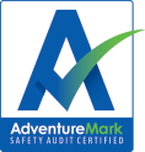ONLINE RISK DISCLOSURE
There has been a lot of talk about disclosing risk this year. We’ve identified that a lot of operators are still very attached to liability waivers and disclaimers and that their own lawyers have encouraged them to keep this information in. The Safety Audit Standard for Adventure Activities doesn’t mention waiving risk, but the Health and Safety at Work Act says that you cannot contract out of any duty owed under the Act. We recommend checking out the new risk disclosure template on the SupportAdventure website.
The Safety Audit Standard does say that “The operator must have procedures for risk disclosure between the operator and participant, and subsequent acknowledgement.” Consider the type of participants you may get, I recall customers arriving for raft trips in tailored pants and patent leather shoes, shocked that they might get wet on their “boat ride”! It makes sense to manage their expectations early. A clear disclosure of risk on your website or online booking system would help with this and could even minimise the chance of a bad TripAdvisor review from someone who was in over their head!
If an opportunity is being provided on the website to register and in particular pay for an activity, then sufficient information should be made available at that point in time to enable a reasonable person to make an informed decision as to whether the adventure activity is suitable for them.
The Whakaari investigation has thrown some weight behind the view that risk disclosure should be made at the time the contract between the parties was entered into, ie when the participant registered. It is not appropriate to semi-disclose risks at the time of booking and then fully disclose the risks when the participant arrives on site.
Talking about risks and the potential danger of adventure activities is not something you should sugar-coat or downplay. Don’t use obtuse wording- tell it as it is. The best form of risk disclosure is good old fashioned basic language with no legal spin. Our society is changing and many of your clients may not have English as their first language. Ensure you know your clients and where possible, cater for additional languages. Disclose risks multiple times to help aid understanding.
As the operator, you have a duty of care and part of that includes taking reasonable steps to ensure the client understands the potential risks and what they should do and should not do to stay safe.

